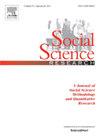Citizenship status and requirement, culture and immigrants’ attitudes toward local immigration: A study of 21 western and non-western societies
IF 3.2
2区 社会学
Q1 SOCIOLOGY
引用次数: 0
Abstract
Background
Understanding the attitudes of immigrants toward local immigration (i.e., immigration in their host societies) is increasingly important in the context of rising international migration and naturalized immigrants. However, little is known about how immigrants view local immigration, especially across societies with different cultures and naturalization requirements.
Objective
This research examines two questions: 1) whether immigrants with and without host-society citizenship view local immigration differently across Western and non-Western societies, and 2) how the potential attitudinal differences between naturalized and non-naturalized immigrants vary across societies with different cultures and naturalization requirements.
Methods
Drawing from World Values Survey data (WVS7, 2017–2022), this study analyzes how naturalized immigrants and non-naturalized immigrants from 21 societies accommodating around 40 % of the world's international migrants view local immigration.
Results
Results indicate that naturalized immigrants exhibit less favorable attitudes toward local immigration than their non-naturalized counterparts, particularly in societies with collectivistic cultures or stringent naturalization processes or without language requirements.
Conclusions
The host-society citizenship is associated with less favorable attitudes toward local immigration. Access to naturalization and its requirements are associated with local immigration attitudes, which can potentially shape the integration environment and overall social cohesion in the host society.
Contribution
The study goes beyond the conventional native-versus-immigrants attitudes in Western contexts and explores the important yet underexplored attitudinal outcomes of naturalization. It analyzes the moderating impacts of the host-society culture and naturalization criteria and combines a multilevel analysis with a coarsened exact matching and machine-learning approach, offering valuable insights for future studies and integration strategies.
公民身份与要求、文化与移民对本地移民的态度:基于21个西方与非西方社会的研究
在国际移民和归化移民不断增加的背景下,了解移民对当地移民(即东道国社会的移民)的态度变得越来越重要。然而,关于移民如何看待当地移民,特别是在不同文化和入籍要求的社会中,我们知之甚少。本研究探讨了两个问题:1)在西方和非西方社会中,拥有和没有东道国社会公民身份的移民是否对当地移民有不同的看法;2)在不同文化和入籍要求的社会中,入籍和非入籍移民之间的潜在态度差异是如何变化的。方法根据世界价值观调查数据(WVS7, 2017-2022),本研究分析了来自21个社会的入籍移民和非入籍移民如何看待当地移民,这些社会容纳了全球约40%的国际移民。结果表明,与非入籍移民相比,入籍移民对当地移民的态度不那么友好,特别是在具有集体主义文化或严格的入籍程序或没有语言要求的社会中。结论:东道国公民身份与对当地移民的不友好态度相关。获得入籍及其要求与当地移民态度有关,这可能会影响东道国社会的融合环境和整体社会凝聚力。本研究超越了西方背景下传统的本土对移民的态度,并探索了归化的重要但未被充分探索的态度结果。它分析了东道国社会文化和归化标准的调节影响,并将多层次分析与粗略的精确匹配和机器学习方法相结合,为未来的研究和整合策略提供了有价值的见解。
本文章由计算机程序翻译,如有差异,请以英文原文为准。
求助全文
约1分钟内获得全文
求助全文
来源期刊

Social Science Research
SOCIOLOGY-
CiteScore
4.30
自引率
4.00%
发文量
0
审稿时长
65 days
期刊介绍:
Social Science Research publishes papers devoted to quantitative social science research and methodology. The journal features articles that illustrate the use of quantitative methods in the empirical solution of substantive problems, and emphasizes those concerned with issues or methods that cut across traditional disciplinary lines. Special attention is given to methods that have been used by only one particular social science discipline, but that may have application to a broader range of areas.
 求助内容:
求助内容: 应助结果提醒方式:
应助结果提醒方式:


